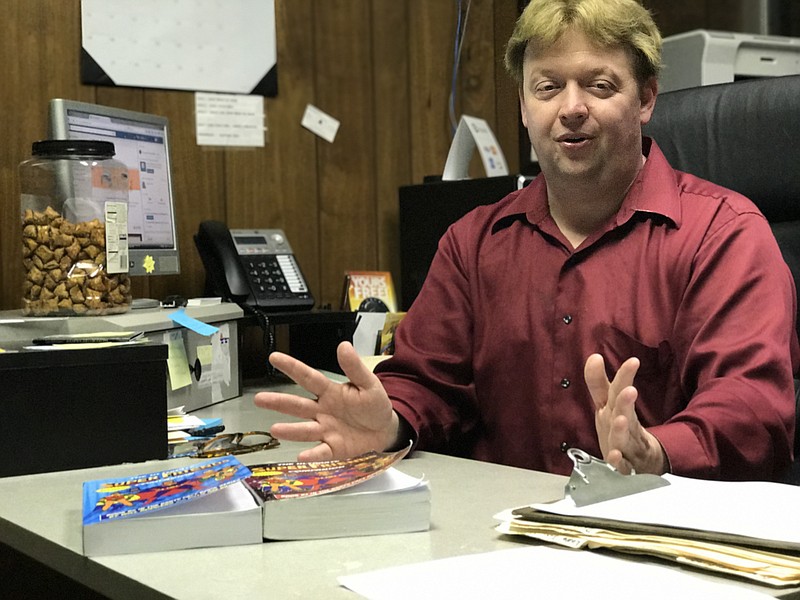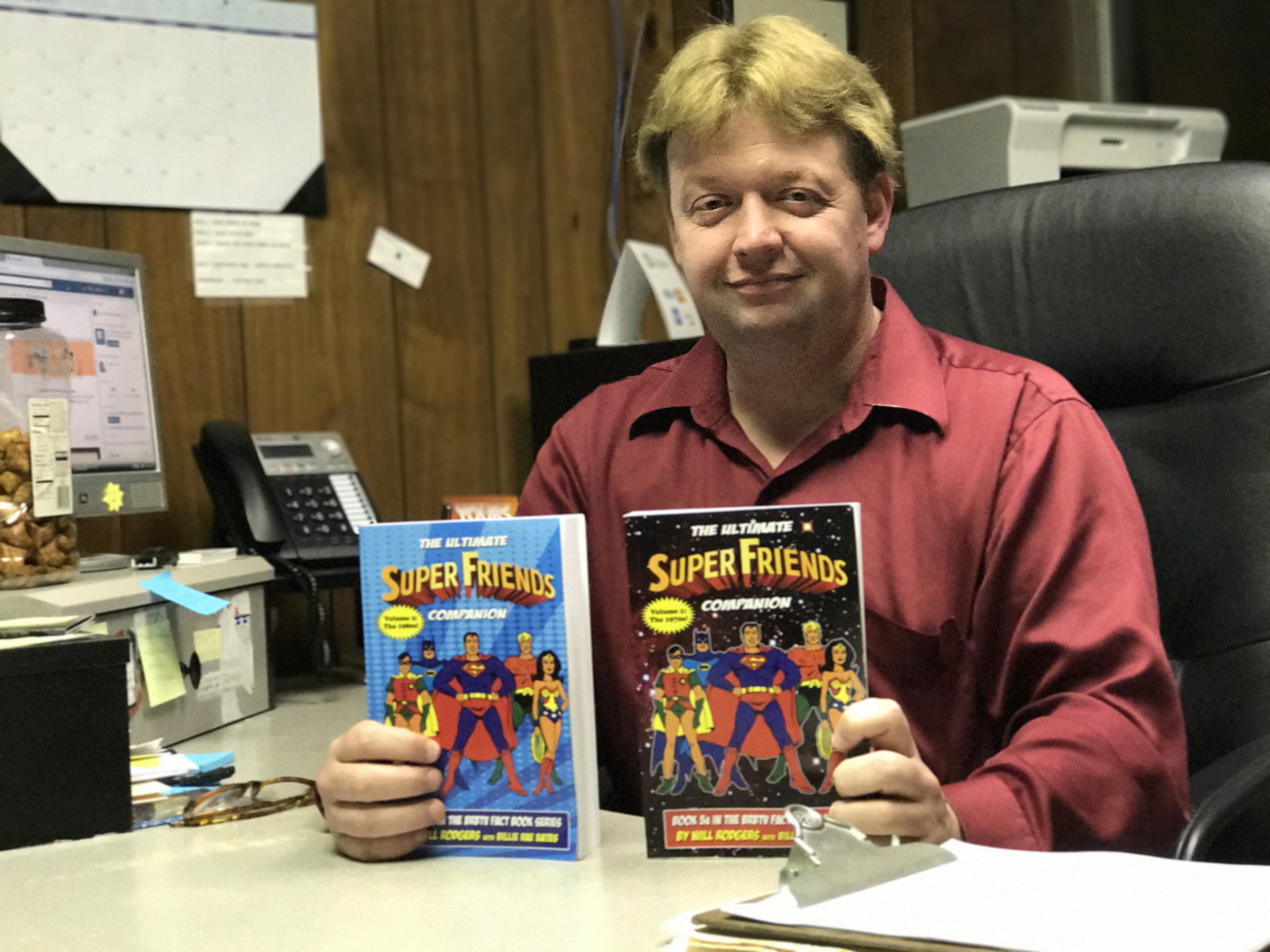The books
› “The Ultimate Super Friends Companion, Vol. 1, The 1970s,” by Will Rodgers, edited by Billie Rae Bates; paperback; $22› “The Ultimate Super Friends Companion, Vol. 2, The 1980s,” by Will Rodgers, edited by Billie Rae Bates; paperback; $24› Both are available on Amazon.com and in ebook form.
Will Rodgers is a super fan of the "Super Friends" cartoon series that ran from 1973 to 1985.
"I know the Super Friends up, down, sideways and inside out," he says. "I love the Super Friends. Maybe too much."
Sitting inside the offices of WEPG-AM 910 in South Pittsburg, Tenn., where he is an on-air personality, Rodgers thumbs through the two-volume set of books he has written about the show. These aren't tiny pocketbook guides either. Each book has more than 400 pages of plot summaries, character descriptions for the good guys and the bad ones, voice actor IDs, a guide to the Super Friends comic books and even a chapter on the toys that came out based on the shows.
Vol. 2 also has a rundown of content for each DVD, representing the shows made in the '80s.
Rodgers spent three years compiling "The Ultimate Super Friends Companion," and you get the sense he could fill another book if pressed.
The books also contain pictures of Rodgers with Shannon Farnon, who voiced Wonder Woman on the series and who provides the books' forewords, and Adam West, who played Batman in the 1960s ABC series and later voiced the character for the "Super Friends: The Legendary Super Powers Show," which ran from 1984 to 1985 on ABC.
He got some of the information from online sources such as Wikipedia and Internet Movie Database, but most of it came from his own personal collection and "up here," Rodgers says tapping his head.
Rodgers, 45, first plopped himself in front of the family TV set in the Harrison area to watch "Super Friends" in the fall of 1977 as a 6-year-old. He fell in love and never fell out of love. Over the years, he has recorded every episode and lately replaced those with DVD versions as they became available.
There were 208 episodes in all, including 60-, 30-, 15- or seven-minute versions. Rodgers has seen each episode dozens of times over the years, but when he got serious about writing the book, he watched them two more times.
"Once just for fun and then for work," he says.
Getting the credits, which scroll across the screen at breakneck speed, took a good deal of time.
He never considered putting his vast knowledge of the show into book form until meeting Billie Rae Bates, a print and broadcast journalist who has used her love of classic television to create the BRBTV series of fact books and reports. She founded BRBTV in 1998 and has created books with interviews, episode guides and fun facts for shows including "Dallas," "Dynasty" and "The Dukes of Hazzard."
Meeting her put the idea of putting Super Friends into book form, Rodgers says.
"I don't consider myself a writer, but meeting her got the wheels turning. I thought, 'The Super Friends deserve to be in a book.'"
At first it was an electronic book only, available to readers in January 2016. Rodgers says people at the comic conventions he attends kept asking when the paper form would come out, so he and Baker released that this past January.
When "Super Friends" first aired in 1973, the country was still involved in the Vietnam War, there were student protests on college campuses, President Richard Nixon was under investigation for his role in the Watergate break-in and cover-up and parents were heavily monitoring television content looking for ways to protect their children from the outside world. Even the Saturday morning cartoons came under their watchful eye, Rodgers says.
"In the '70s, superheroes couldn't punch or hit the bad guys, and there were no words like 'kill' or 'murder' or even 'dead,'" Rodgers says.
"Superheroes had to stop crime nonviolently. They even had [public service announcements]. I think the reason I never drank or smoked was because I watched so many PSAs."
Even the villains were not really villains in the evil sense so much as they were misguided scientists.
"Super Friends," therefore had a campy, squeaky-clean kind of vibe that for Rodgers, made it special. It also used what Rodgers calls "radio dialogue," where the characters announce in dramatic fashion exactly what they are doing, even though the viewer could clearly see them chasing a bad guy or stopping a car from going over a cliff.
"Super Friends" was produced by Hanna-Barbera and was based on heroes from the Justice League of America and other DC Comics characters such as Superman, Batman and Robin, Wonder Woman and Aquaman. The series ran on Saturday mornings at various times over the years and with a variety of titles such as "The All-New Super Friends Hour," "The World's Greatest Super Friends" and "The Super Powers Team: Galactic Guardians."
Actors who provided voices included Olan Soule (Batman), Danny Dark (Superman), Ted Knight (narrator) and Casey Kasem (Robin).
For Rodgers, part of the fun was not only discovering who voiced what, but what other series the actors worked on. Soule made guest appearances as the choir director on a couple of "The Andy Griffith Show" episodes and appeared in "Dallas," "I Love Lucy," and "North by Northwest." Knight is best known as Ted Baxter from "The Mary Tyler Moore Show," and Kasem (Robin) created and hosted "American Top 40" and also did voice work for "Scooby-Doo" and many other shows.
Contact Barry Courter at bcourter@timesfreepress.com or 423-757-6354.

